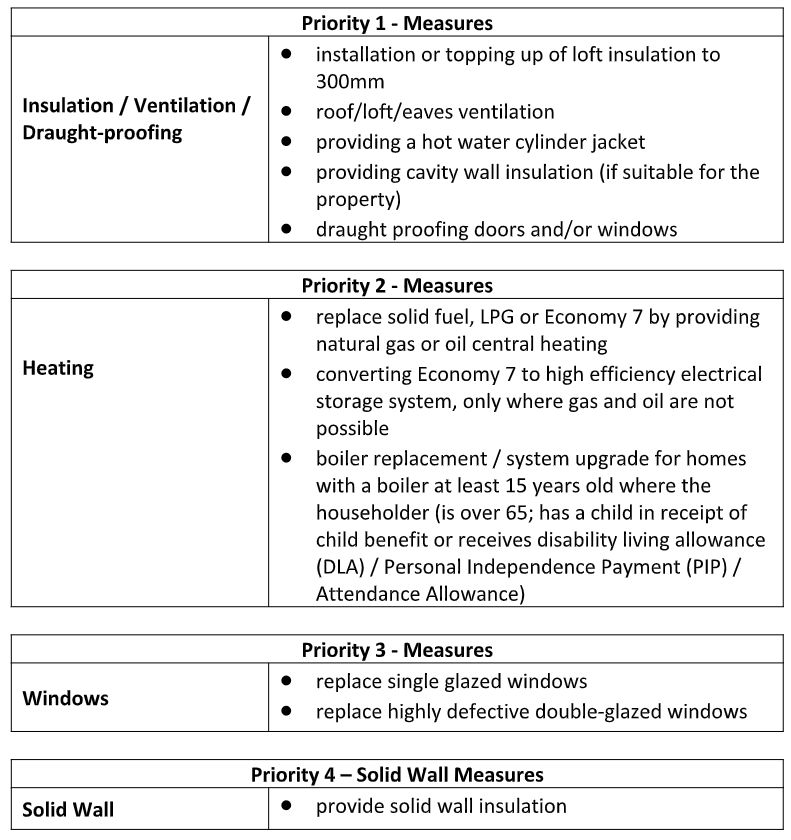Affordable Warmth Scheme
Affordable Warmth Scheme
The scheme provides grant aid to support improving the energy efficiency of your home and can also provide for a replacement of your old heating system.
The Housing Executive works in partnership with local Councils to deliver the Scheme throughout Northern Ireland.
Who is eligible?
The Affordable Warmth Scheme is available to homeowners and those who privately rent their home with a gross annual household income less than £20,000. If you rent privately, you’ll need your landlord’s permission before any work can go ahead and your landlord will have to pay 50% of the cost of the work.
How does the scheme work?
All councils across Northern Ireland will be targeting households identified as eligible for energy efficiency improvement work under this scheme. Areas considered most in need of energy efficiency measures will be contacted first.
Council staff will visit homes in their area to encourage and help householders to take part in the scheme.
Council staff will:
- make contact with households likely to be affected by fuel poverty;
- ask the residents to complete an application form;
- send the completed application form to the Housing Executive; and, if necessary
- contact the Social Security Agency’s ‘Make the Call’ team to request a Benefit
Entitlement
Check for the householder.
You can also contact your local council to see if you might qualify for help.
What level of support (£) is available?
The maximum amount that will be spent on any one property is £7,500. If your property is selected for solid wall insulation, this can be increased to £10,000.
What measures are available?
For homes that qualify, the Affordable Warmth Scheme offers a range of energy efficiency measures that will be carried out in the order of priority below.

How do I know what work is needed?
A Technical Officer from the Housing Executive will visit your home to see if you are eligible for the scheme and what energy efficiency measures, if any, would suit your home. They will assess if any of the measures (see below) provided by the scheme are required in your home. The assessment may take 35-60 minutes depending on your property’s size, type and energy needs.
Much of the inspection will be a visual assessment of the rooms, walls and attic – although properties with cavity walls will have a borescope inspection carried out to identify the property’s cavity needs.
How do I know what support I am entitled to?
If you qualify for support, and funding is available, you will be sent an ‘Approval Pack’ which will
confirm that you can start work and…
- how much grant aid you have been awarded
- what energy efficiency measures you can carry out (and in order of priority)
- when the work in your home should be completed by
You should not start any work until you have received written approval from the Housing Executive as they will not pay for any work started before written approval is given. Once you receive approval you have three months to ensure all work is completed.
Who can do the work in your home?
Once the approval is provided then it is your responsibility to appoint a contractor to undertake any improvement works in your home. It’s important to check their qualifications and experience to be confident that they will do a good job. The contractor must ensure that all works carried out in your home comply with building regulations and any other statutory requirements.
If you are installing or replacing a central heating system you should be satisfied you are using a competent installer and where a gas boiler is put in you must use a registered Gas Safe Engineer.
What If I am renting my home?
If you rent your property from a private landlord you may qualify for help through the Affordable Warmth Scheme but your landlord must:
- agree to the energy efficiency measures being installed in the property;
- be registered with the Department for Communities’ Landlord Registration Scheme; and
- make a 50% contribution to the total cost of the energy efficiency measures to improve their property.